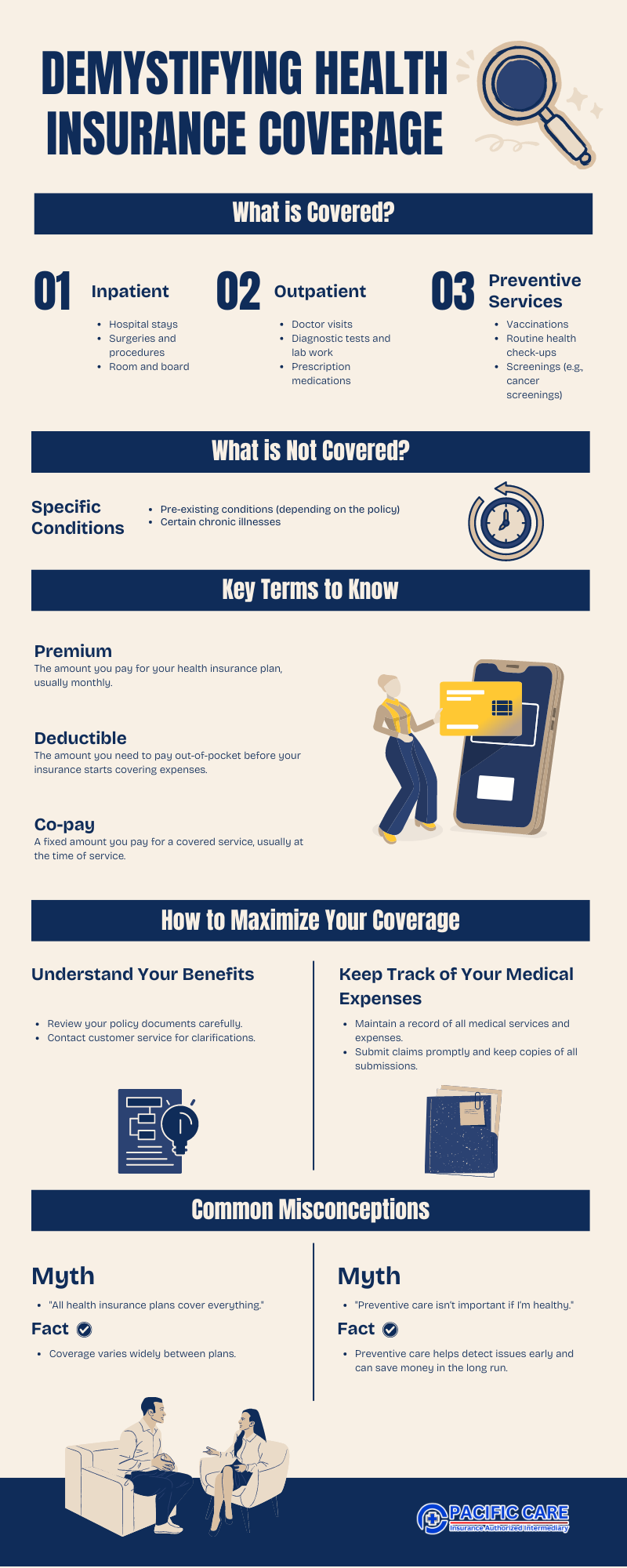Demystifying Health Insurance Coverage

Navigating the world of health insurance can often feel overwhelming, but understanding your coverage is crucial for making informed decisions about your healthcare. In this blog, we'll break down the essentials of health insurance coverage, what is typically covered, common exclusions, key terms you should know, and how to maximize your benefits

Health insurance plans generally cover a wide range of medical services, which can be categorized into three main types: inpatient care, outpatient care, and preventive services.
Inpatient Care:
- Hospital Stays: Coverage for room and board, nursing care, and other hospital services.
- Surgeries and Procedures: Costs associated with surgical operations, including surgeon fees and anesthesiology.
- Room and Board: Accommodation charges during your hospital stay.
- Doctor Visits: Appointments with primary care physicians and specialists.
- Diagnostic Tests and Lab Work: Blood tests, X-rays, MRIs, and other diagnostic procedures.
- Prescription Medications: Coverage for prescribed drugs, though the extent can vary based on your plan.
- Vaccinations: Immunizations to prevent diseases.
- Routine Health Check-Ups: Regular check-ups and physical exams.
- Screenings: Early detection tests such as cancer screenings, blood pressure monitoring, and cholesterol tests.
Understanding what your insurance plan does not cover is just as important as knowing what it does. Common exclusions often include:
Exclusions:
- Cosmetic Surgeries: Procedures for aesthetic purposes are usually not covered.
- Experimental Treatments: Treatments that are not widely accepted as standard practice in the medical community.
- Alternative Therapies: Services like acupuncture or chiropractic care, depending on your plan.
Specific Conditions:
- Pre-Existing Conditions: Some plans may exclude coverage for conditions that existed before the start of the policy.
- Certain Chronic Illnesses: Depending on the policy, some chronic conditions may have limited coverage.
To navigate your health insurance plan effectively, familiarize yourself with these key terms:
- Premium: The amount you pay for your health insurance plan, typically on a monthly basis.
- Deductible: The out-of-pocket amount you must pay before your insurance begins to cover expenses.
- Co-Pay: A fixed fee you pay for a covered service at the time of the visit.
- Co-Insurance: The percentage of costs you share with your insurance company after meeting your deductible.
- Out-of-Pocket Maximum: The maximum amount you pay during a policy period before your insurance covers 100% of additional costs.
Maximizing your health insurance benefits can help you save money and ensure you receive the best possible care. Here are some tips:
Choose In-Network Providers:
- In-Network vs. Out-of-Network: In-network providers have agreements with your insurance company to provide services at reduced rates. Using out-of-network providers can result in higher out-of-pocket costs.
- Cost Savings: Always check if your provider is in-network to minimize expenses.
- Policy Documents: Review your policy documents thoroughly to understand what is covered.
- Customer Service: Contact your insurance providers customer service for any clarifications or questions about your coverage.
- Records: Maintain a record of all medical services and expenses.
- Claims: Submit claims promptly and keep copies of all documentation.
Common Misconceptions
There are several misconceptions about health insurance that can lead to misunderstandings about coverage:
Myth: "All health insurance plans cover everything."
Fact: Coverage varies widely between plans. Always review your specific policy details.
Myth: "Preventive care isnt important if Im healthy."
Fact: Preventive care helps detect issues early and can save money and improve long-term health outcomes.
Conclusion
Understanding your health insurance coverage is essential for making informed healthcare decisions and maximizing your benefits. By knowing what is covered, recognizing common exclusions, familiarizing yourself with key terms, and following tips to maximize your coverage, you can navigate your health insurance plan with confidence and ensure you receive the care you need.




